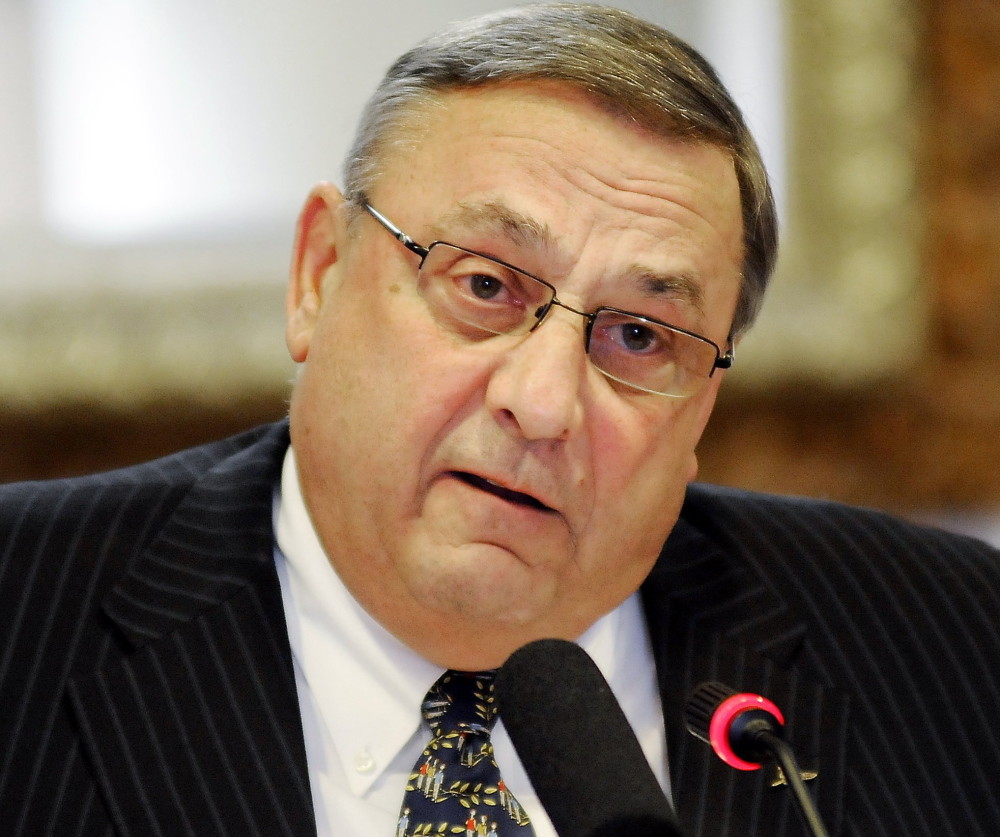In a further escalation of tensions between the state of Maine and its four federally recognized Indian tribes, Gov. Paul LePage has revoked his own 2011 executive order aiming to promote cooperation between the parties.
The move, announced to the tribes by email Saturday morning, came in the form of a fresh executive order in which the governor says efforts to improve relations with the tribes “have proved to be unproductive because the state of Maine’s interests have not been respected.”
Tribal leaders said the practical effect of rescinding the order will be limited, as it had gone largely unimplemented, but that the symbolic significance is damaging and counterproductive, particularly at a time of rising tribal-state tensions over fisheries, domestic violence jurisdiction and child welfare.
“I don’t understand the value of the governor of the state taking the time to revoke such an order,” said Kirk Francis, chief of the Penobscot Nation, whose reservation is north of Old Town. “It does nothing but fuel an already volatile relationship.
“It seems like what they are saying at the end of the day is that we will respect your sovereignty as long as you do what we tell you. That’s not how sovereign relationships work.”
LePage’s office did not respond to requests for comment.
The August 2011 order directed every state agency and department to develop and implement policies that recognized tribal sovereignty, promoted communication and tribal input on issues affecting them, and fostered tribal-state partnerships to provide services. It also required state departments and agencies to have tribal liaisons.
But since that order was issued, the tribes and the LePage administration have clashed over several issues, including regulation of the elver fishery and the management of the Penobscot River. On Feb. 2, the U.S. Environmental Protection Agency issued a ruling defending tribal sustenance fishing rights in the Penobscot and St. Croix rivers, which LePage blasted as “outrageous.”
‘PRELUDE TO CONFLICT’
Fred Moore III, chief of the Passamaquoddy tribe at Pleasant Point, near Eastport, said LePage’s move to rescind his 2011 order was a “prelude to conflict” that did nothing constructive for the tribal-state relationship.
Moore was not surprised by the move, however, as LePage had threatened to withdraw the order in a contentious April 1, 2013, speaker phone conversation with Moore’s predecessor, Clayton Cleaves, that was overheard by Moore and several other members of the tribal council. LePage’s phone call – prompted by a dispute over tribal fishing of baby eels, or elvers – included a number of threats, those who overhead it have since said.
“He said he was going to rescind the executive order and withdraw support for the Truth and Reconciliation Commission, and he was going to send the National Guard after us to force adherence to state (fishing) law,” Moore said. “Now we’re waiting for him to turn away from the TRC and deploy the National Guard.”
The Maine Wabanaki-State Child Welfare Truth and Reconciliation Commission was formed in 2012 to investigate abuses of the child welfare system by state agents who systematically removed children from Indian households. Its five members include Secretary of State Matt Dunlap.
Matt Dana II, the Passamaquoddy representative to the Legislature, said LePage’s action “will definitely put greater stress on an already declining relationship.”
“The relationship does not have to be an ‘us against them’ interaction,” Dana said by email. “The tribes have tried in many instances to work with the state, but almost always face an unwilling party within Maine government, whether it be the attorney general, the Legislature or the chief executive.”
ONGOING STATE-TRIBaL DISPUTES
The Penobscots and Passamaquoddy are currently locked in disputes with the state over saltwater fishing rights, tribal jurisdiction over domestic violence cases by non-Indians on their reservations, and land use regulation on the tribe’s extensive, off-reservation trust lands.
The Penobscot Nation also has sued the Maine Attorney General’s Office in federal court over the state’s assertion that the tribe has no special rights in the main stem of the river that bears its name.
A legislative panel is scheduled to take up the domestic violence jurisdiction bill on May 12. A federal judge is considering the state’s and tribe’s respective motions for summary judgment in the Penobscot River case; if they are rejected, Francis is expecting a final decision on the issue toward the end of the summer.
Send questions/comments to the editors.




Comments are no longer available on this story